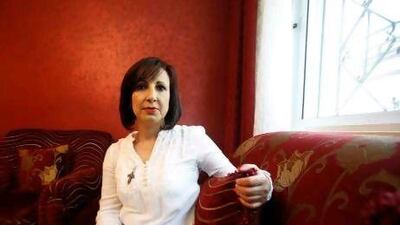AMMAN // Civil society groups and human rights organisations in Jordan are backing a woman who is suing an Islamic bank that sacked her because she refused to wear the hijab.
Vivian Salameh, a Christian, finds herself at the centre of the debate over how accommodating Jordan should be when Islamic and secular principles clash.
She was sacked last month after she refused to wear the head cover, imposed on all female employees as part of a dress code introduced in January 2011 by the Jordan Dubai Islamic Bank.
The Jordanian Network of Civil Society Organisation, which consists of 10 rights groups and NGOs, expressed its concern over Ms Salemeh's sacking and urged the bank to "return her back to her job".
It said: "The bank's management got approval from the ministry of labour to enforce its new regulations without taking into consideration that they contravene the Jordanian constitution and international covenants which the country has signed.
"They respect the right of choice and personal freedoms and there are no laws that impose the head cover on Christian employees."
The bank claims it is a matter of an employee complying with company dress code.
Eman Afaneh, its head of corporate communication and marketing, said it is like, "McDonald's where employees put on hats during working hours. It's part of the uniform and nobody would make an issue out of it."
Ms Salameh said she complied with most of the dress code: a dark blazer extending to the hips and loose trousers or a long skirt. But she drew the line at the headscarf.
"I respect the hijab, but it represents Muslim women and I am Christian," Ms Salameh, 46, said last week in her flat in Amman.
"I told the management I am happy to wrap the cover around my neck. They can see that I wear the cross and it doesn't go along with a hijab."
Indigenous Christians, who make up about 4 per cent of the 6.5 million population, live in harmony with Jordan's Muslim majority. But the story has struck a delicate nerve there.
Critics of Ms Salameh compare her quandary to the debate about religious freedoms in Europe, citing France where laws ban women from wearing the niqab and Turkey where veiled university students were once denied education.
Ms Salameh worked at Jordan Industrial Development Bank for 25 years. In 2010, it was restructured and turned into Jordan Dubai Islamic Bank, an offshoot of the UAE-based Dubai Islamic Bank.
The bank is an Islamic institution that complies with Sharia values.
The new dress code bans women from wearing flashy colours, tight trousers, high heels or shoes that make noise. It also requires that women wear the head cover.
In March 2011, the bank distributed another memo instructing employees again to wear the headscarf or face disciplinary action. Four other Christian women at the bank complied. Ms Salameh, however, insisted she would not and she was dismissed on May 22.
"Things happened so quick. Two warnings in one week and then I was dismissed," Ms Salameh said. "One should not be judged on religion but on performance."
The bank's Ms Afaneh said Ms Salameh was dismissed because she was not committed to the dress code.
"It is not an official head cover," she added. "It partially covers the hair and it reflects the spirit of the bank. You only wear it at work. It is just like the Emirate Airlines … It is part of the uniform and nobody would make an issue out of it."
Ms Salameh, however, decided to sue. The bank has violated labour rights and infringed on religious freedoms, said her lawyer, Hani Dirani.
Ms Salameh's story has stoked some unease among Christians, who since the Arab Spring have become increasingly worried about their status in a region where political Islam is making gains.
Audeh Qawas is a former Christian member of parliament and an independent human-rights activist, and he supports Ms Salameh. He said: "You cannot enforce a religious symbol on a Christian or a Muslim. The hijab is a religious symbol.
"I cannot force a Muslim woman to wear a cross if she works at a Christian institution. This has to do with personal and religious freedoms.
"The case has wider implications," he said. "We are not against political Islam, but we are concerned Islamists would dictate their social agenda on us."
He added that he had been contacted by the bank and that attempts were under way to resolve the case out of court.
"The most important thing is to preserve Muslim-Christian ties."
Both critics and supporters of Ms Salameh have shared their views on dozens of websites. Some said an Islamic bank should employ Muslims only. Conservatives criticised her and accused her of taking advantage of her case to distort the image of Islam.
Ms Salameh "should not have considered it as a sectarian issue", said Marwan Shehadeh, an analyst who specialises in Islamist movements. "There are people who are trying to distort the image of our religion for personal gains."
Saud Qubeilat, a commentator with Arab Al Yawm, a Jordanian independent daily, "lauded her courage", in a column last week.
"Vivian is not fighting a personal battle because she is Christian," he wrote. "If she was a Muslim, it will not be a different issue. At the core of the matter is a grave violation of personal freedoms guaranteed by the constitution."

